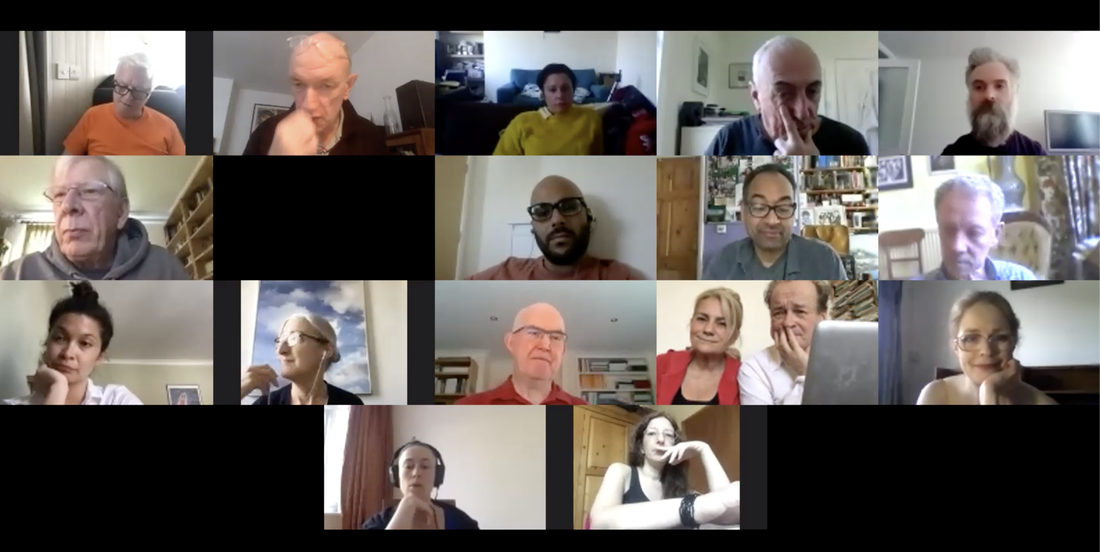|
Present: Helen Budge, Colin Ellwood , Kirsten Foster, Simon Furness-Gibbon, Valerie Gogan, David Hounslow, Emmanuela Lia, Robert Lightfoot, Kevin McMonagle, Jamie Newall, Anthony Ofoegbu, Susan Raasay, Zara Tomkinson, Simon Usher, David Whitworth, Julia Winwood, Hemi Yeroham, Laurie Slade (Guest) For our 3rd-ever Zoom session, this was a full-afternoon’s journey reading Robert Holman's intimate epic Rafts and Dreams from 1991, in which a tale of escape from domestic abuse gets subsumed by almost another narrative entirely, of cataclysmic global flooding. The Tufnell Park house-share of the main characters becomes literally a raft swept by flood waters (which emanate from a hole in the characters’ garden caused by an uprooted tree) via polar regions to equatorial Africa. The survivors – an OCD-suffering army wife, her insecure but loving Sgt. Major husband, and their neighbour, a trainee-doctor whose childhood with a pimp/prostitute mother involved some horrendous abuse recounted here in baroque and disturbing detail – all wrestle with the fallout from both the unfolding aquatic global emergency and from their earlier traumas. They variously overcome or succumb to the latter by means of challenges presented by the former, such as are offered for example by encounters with a live chicken and a decomposing caribou. The former encounter is strikingly and unexpectedly moving, as the OCD sufferer faces and overcomes her fear of contamination when the raft reaches Africa, by means of physical contact with said chicken when offered it by a local woman suffering from leprosy, apparently as a welcoming gift. Close to an ultimate test for a germaphobe, surely. This is a play that somehow makes the borderline-risible seem inevitable, necessary and telling. Not unlike in a dream, in fact. On their travels the central trio are joined first by the wife of a now-imprisoned solicitor who had repeatedly staged and filmed the student-doctor’s childhood abuse, and subsequently by the precocious teenaged son of an aged C of E Bishop found drifting on a passing ice-flow. The script, after a highly dramatic and determinedly realist opening, amplifies the apparently-random-but-significant ‘feel’ of a dream in regard to its external incident, as if the flood water had cracked open and warped the play's space-time continuum, while the characters themselves continue to behave in a psychologically realist way, taking the various serendipitous arrivals and strange global journeyings almost in their stride, as of course you do in dreams. At the point where the rotting caribou carcass is quietly repurposed as a sail for the raft, you begin to realise the play is even more sneakily subversive than even its ‘flood’ narrative implies. With its characters' realistic mental health issues and admittedly grotesque childhood trauma held in tension with its broader dislocated 'ecological/global/dream' dimension, there is a bold sense of the whole being disorientatingly ‘out of phase’. But that almost Kafkaesque effect makes the play stick to the unconscious like burrs. The trajectory of the characters’ inner journey is perhaps mirrored/amplified in the over-arching epic travel narrative, transitioning from Arctic cold towards Equatorial warmth, and there is fresh directness and simplicity of statement in the dialogue. Everyone just 'delivers' their back story and their diagnoses of each others psyches in a very stark way which, together with the home-made, equivalently stark feel of the drama as a whole, is at times refreshing. In fact it's as if the play is the dream of the slightly autistic-spectrum Bishop’s son who was found adrift on an ice flow painting the vista before him in oils. Tellingly, despite the human and animal drama in his painting, his main focus is on the colours on display. Latterly he is tacitly adopted by the student doctor and the disgraced solicitor’s wife. Unaware that his unacknowledged new ‘father’ has subsequently walked out of earshot and apparently shot himself rather than face the challenges of living, the boy has what is in effect the play’s final and perhaps ultimately orientating, anchoring statement. This apparent non-sequitur recalls a moment earlier in his life and implies that the play' prevailing sense of ‘un-moored-ness’ has bee on account of something that has been missing from everyone’s experience all along, a sense of familial love and trust:
At Gatwick, Jo, coming home, my parents were there, and I absolutely surprised myself by rushing straight into their arms. That was it, that's all it was, I was home. The group's reading overall was careful and measured, everyone sticking with it and feeling their way through, probing constantly, rather as if we were ourselves guardedly crossing a vast, mysterious tundra, sparsely populated with some gloriously exotic fauna. As Oscar Wilde almost said of Wagner, this play had many exquisite moments embedded in some perplexing half-hours.
0 Comments
Leave a Reply. |
INDEX of dates:
INDEX of playwrights and plays:
INDEX of contributors:
|

 RSS Feed
RSS Feed
